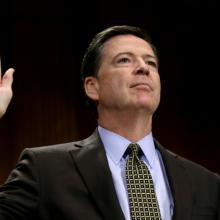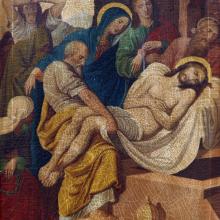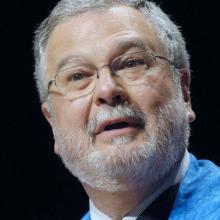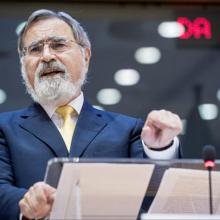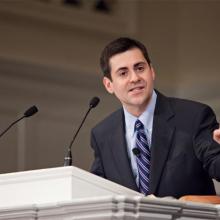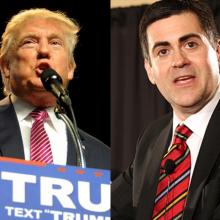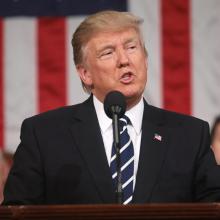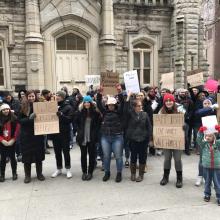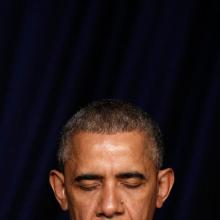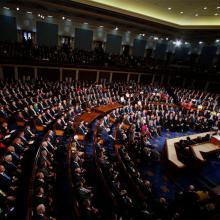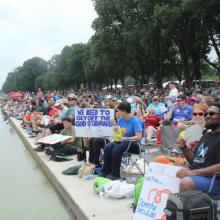Christians
The heightening militarism following Trump’s invitation to Duterte is neither unrelated nor isolated from U.S imperialism in the Philippines — a history that is often manipulated through religious language.
The determination to not let Runkles “walk” when she completes her studies at the Hagerstown school prompted a sharp critique from Students for Life of America, which asked its supporters to urge the school to reverse its decision.
But Hobbs said the school is standing its ground about the June 2 ceremony for Runkles’ class of 15 students.
As the country and world saw last night, without any warning or usual procedures, President Donald Trump fired FBI Director James Comey. The only reason given for Comey’s firing was his treatment of Hillary Clinton’s e-mail case — which is laughable, given Trump’s own past statements and myriad contradictions on these matters, even if one agrees that Comey’s behavior and double standards in regard to that case were unprecedented and indefensible.
In the midst of so much death, how can we Christians celebrate Easter?
These questions can be paired with questions regarding our own sense of worship on that day. How much have we Christians replaced justice with worship, not taking one into serious relation with the other? Are we accustomed to worship in the total absence of justice?
The Rev. Peter Morales, the first Latino president of the liberal and theologically diverse association, resigned effective on April 1, as criticism mounted over hiring practices.
“It is clear to me that I am not the right person to lead our Association as we work together to create the processes and structures that will address our shortcomings and build the diverse staff we all want,” he wrote in his March 30 resignation letter to the UUA’s trustee board.
Rabbi Jonathan Sacks made a name for himself as chief rabbi of Great Britain for nearly a quarter-century, a time of great tumult that included the Sept. 11, 2001, attacks, the influx of millions of Muslims into Europe, and the ongoing pressures to absorb and assimilate newcomers into a mostly secular society.
As chief rabbi, from 1991 to 2013, he stressed an appreciation and respect of all faiths, with an emphasis on interfaith work that brings people together, while allowing each faith its own particularity.
Leaders of the Southern Baptist Convention’s Ethics and Religious Liberty Commission have affirmed ethicist Russell Moore, despite his criticism of President Trump that caused some to consider withholding funds from the denomination.
“For us not to stand in affirmation of the principles that Dr. Moore has espoused would be unfaithful to the mission entrusted to us by the Convention,” wrote the Executive Committee of the Ethics and Religious Liberty Commission in a statement posted on March 20, on the website of the agency that Moore leads.
Dutch Muslims are breathing a sigh of relief after the worse-than-expected performance of anti-Islam populist Geert Wilders in this week’s election.
“We have trust in the future” of this traditionally welcoming country, said Rasit Bal of the Muslims-Government Contact Organization, an advocacy group, which feared a victory by Wilders’ PVV party would strengthen the anti-immigrant sentiment in the Netherlands.
The Trump administration’s hard-line stance on undocumented immigrants is polarizing: People have responded with either “throw the bums out” or “have a heart.” But the question of whether faith communities can legally offer the undocumented physical sanctuary — sheltering them in churches, synagogues, and mosques to keep them from immigration authorities — is not so cut and dry.
The pro-Trump evangelicals suffer from a spiritual crisis, not a political one.
Moore has challenged the foundations of conservative evangelical political engagement because they desperately needed to be shaken. For 35 years, the old-guard religious right has uncritically coddled, defended, and promoted the Republican Party.
President Trump, long-chided for failing to address a surge in hate crimes, began his first address to Congress by invoking Black History Month, and condemning recent threats against Jewish institutions and the shooting of Indian men in Kansas City.
A survey released last week by the Pew Research Center suggested a very different view of the presidential actions, especially among white Protestant Christians.
There was strong support among white evangelical Protestants, with more than three-quarters (76 percent) saying they approve of the policies outlined in Trump’s order. Among white mainline Protestants, 50 percent approved.
Many Christians now are asking the question Helena Leffingwell of Arlington, Texas – not a pastor or ministry leader, just a regular member of Gateway Church, a nondenominational megachurch – put into words: “How can we see things so differently?”
After sessions on gravitational waves, nuclear forensics, and artificial intelligence, one of the world’s largest general science conferences invited attendees to hear from an Episcopal priest.
The Rev. Fletcher Harper preached on climate change, and how to get a vast segment of the world’s population to pay better attention to what scientists know but many others doubt: that the problem is worsening and portends disaster.
“My entreaty for scientists is to be able to speak publicly about why you care,” said Harper, executive director of GreenFaith, an interfaith nonprofit that aims to galvanize religious people to safeguard the environment.
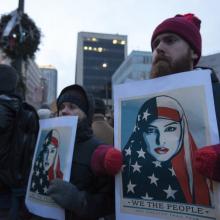
Image via RNS/Fibonacci Blue/flickr.com
The world seems to be witnessing increasing levels of violence, fear, and hatred that challenge us each day. There are ongoing debates about how or whether to welcome immigrants and refugees to the United States; news headlines remind us about the plight of Syria and about the horrors of the Islamic State.
In such times, talk about mercy may seem more like wishful thinking. But mercy matters – now more than ever.
Pope Francis has called for prayers for the Rohingya, the Muslim minority group forced to flee violence and persecution in Myanmar.
In other comments published Monday, Chaldean Patriarch Louis Raphael I Sako of Baghdad also said Trump’s policy of preferential immigration for Christians was a “trap” and would “create and feed” tensions with Muslims.
“This magnificent grace, this expansive grace, this ‘Amazing Grace’ calls me to reflect. And it calls me to pray. It calls me to ask God for forgiveness, for the times that I’ve not shown grace to others, those times that I’ve fallen short.”
All was apparently going fine until Micha Brumlik, a retired Frankfurt University education professor and respected Jewish commentator, wrote last June that the popular toy was “anti-Jewish, if not even anti-Semitic.”
The problem, he said, was the inscription on the open pages of the Bible that the Playmobil Luther holds. On the left is written in German: “Books of the Old Testament. END,” while the right page says “The New Testament, translated by Doctor Martin Luther.”
The United States Congress is about as Christian today as it was in the early 1960s, according to a new analysis by Pew Research Center.
Nearly 91 percent of members of the 115th Congress convening on Jan. 3 describe themselves as Christian, compared to 95 percent of Congress members serving from 1961 to 1962, according to congressional data compiled by CQ Roll Call and analyzed by Pew.
When President Obama signed a newly strengthened international religious freedom act on Dec. 16, the intention was to protect religious believers around the world.
But the freshly signed act is being heralded by some legal scholars as a different milestone — for the first time, atheists and other nonreligious persons are explicitly named as a class protected by the law.


